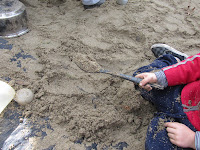

“Technology is about helping people and solving problems” (Smorti, 1999, p.6). I have found that this quote has greatly aided me in understanding the purpose of technology as well as defining what technology means in our world. From the comments I have received on my blogs I have noticed a theme in which all of us have struggled with accepting that technology is not just computers, I pods and TVs. I personally know that this was a challenge for me, however seeing others blogs have helped me to see what technology is defined as; this is tools that can help us and solve our problems- this could be as simple as a cup, magnet, books and many others.
Understanding that technology is more than just electrics, has had many benefits for my own learning and professional growth. I am now constantly observing children and fostering their learning around different uses for spoons, cups, pencils, paper etc. This is highlighting the importance of understanding all aspects of technology so we can further learning. Andrew’s comment around trial and error has furthered my understanding that, children’s technological trial and error experiences are an important part of learning. Through this I have learnt that I need to support children in finding new tools that may work. Children may give up if something does not work the first time; I now know I should encourage and support children to problem solve and not give up.
Another key component around technology that I have discovered through comments is that, balance needs to exist around technology. I have discovered that majority of my group agree that digital technologies are useful tools in supporting children to become technology literate, as well as enhancing a knowledge base through discovering new information. I especially liked how Andrew linked this to Vygotsky’s scaffolding theory as children discover new information from others. While digital technology is important, my group constantly mentioned having a balance with other areas of the curriculum. Clare posed the question of how would I balance the modern technological world with a child’s outdoor environment. In response to this I plan to encourage learning to take place in all areas. The computer is used to source information however I will encourage children to gain real life experiences and not think the computer is the only way to solve problems and seek answers. For example if the children had an interest in nature we could search leaves, flowers and insects on the internet and make a chart of the ones we wanted to find. We could then venture into the outdoors and go on a ‘hunt’ in order to find them. We could them possibly view what we find under a magnify glass which introduces new technology. Not only would this foster computer skills, it would allow a coinciding balance where children gathered information through many different means.
 Through discussing the need for balance I have learnt that technology is not a substitute for all other learning experiences to be ignored. Technology is merely another source of learning. Tsantis, Bewick & Thouvenelle (2003) state computer interactions cannot produce the same result as physically engaging in the sandpit, with water or building block towers. This is a powerful statement that highlights the joy and importance of real interactions with materials and people. From this I have developed the knowledge that digital technology should be used to build on interests and knowledge. Tsantis, Bewick & Thouvenelle (2003) further state digital technology can “enhance, extend and augment children’s learning experiences” (p.7). I understand the benefits of digital technology and I feel they are useful tools, however I have learnt that they should not be relied on; children should be supported and encouraged in finding knowledge in new places-like the outdoorsJ.
Through discussing the need for balance I have learnt that technology is not a substitute for all other learning experiences to be ignored. Technology is merely another source of learning. Tsantis, Bewick & Thouvenelle (2003) state computer interactions cannot produce the same result as physically engaging in the sandpit, with water or building block towers. This is a powerful statement that highlights the joy and importance of real interactions with materials and people. From this I have developed the knowledge that digital technology should be used to build on interests and knowledge. Tsantis, Bewick & Thouvenelle (2003) further state digital technology can “enhance, extend and augment children’s learning experiences” (p.7). I understand the benefits of digital technology and I feel they are useful tools, however I have learnt that they should not be relied on; children should be supported and encouraged in finding knowledge in new places-like the outdoorsJ. Through reading many blogs and comments I have discovered that demonstrating is a useful tool in supporting children to understand technology around them. I believe in giving children free exploration and not telling them how to do things the way I think it should be done. However Andrew states that sometimes children need to be shown the basics in order for their learning to flourish. Andrew then suggested I turn to MacNaughton and Williams (2009) for guidance. I value Andrew’s suggestion and I found this book to be greatly helpful in my learning around demonstrating. One aspect of this chapter that stood out to me was the importance of not relying solely on demonstrating as a tool to tech young children as it may “reduce their capacity to innovate and discover things for themselves” (p.46). From Andrew’s advice I can see how it is important to demonstrate the basics of technology and from then on provide support but not constantly show what the right way to do something is (this then has strong links to trial and error- children learn through trying things out). Therefore I will encompass demonstrating into my technological learning and teaching but will be aware of the amount I use in order for children to discover and explore on their own.
In an overall reflection, I have come to learn that technology; digital and non-digital are crucial to children’s learning and development. Technology provides another means of exploration and helps children to become accustomed with technology in their culture. I also feel digital technology is vastly different to books and other play materials; this may provide support for many different learning styles that we may encounter. This course has really opened my eyes to technology and I now see that it is all around us; often we take the most simple, helpful technology for granted. I feel we have become so reliant on all aspects of technology, that we do not realise how different our lives would be if we did not have it. Furthermore I can now see the importance of encompassing a curriculum that fosters the use of technology; children are growing up in a digital world, we can no longer ignore the strong presence of technology in their lives. I strongly believe that fostering children in understanding technology in their early years will provide for a smoother transition into school where a great technological leap is avoided. In addition, through encompassing a technology curriculum we are adhering to Te Whāriki He Whāriki Mātauranga mō ngā Mokopuna o Aotearoa (1996) which mentions technology encourages “growing experience in solving problems and develops children’s understanding of how technologies can help them and others” (p.96). Hopefully this will aid children in their future learning around technology in their world.
 Through doing this course I have been able to divulge into the world of technology and see the great significance it has to children learning. I have found that before I would see children using cameras and I would over look it. Now I have been exposed to the fact that many children do not have the opportunity to experience cameras; therefore I value the camera more now as I feel it provides learning and understanding about common aspects in our society. I can now see the socialisation and rich, language, mathematical, design and use of technology learning that occurs. Children are constantly experiencing new technologies and developing understanding about how they work and the uses that they have. Therefore as techers we not only have the responsibility to provide digital experiences for children; we also need to encompass non-digital technology and foster children’s learning around it. Instead of taking non-digital technology for granted we need to include it in our teaching-discuss uses of spoons, cups etc with children. We can also discuss the design of technology and possibly even get children to design their own technology and problem solve through understanding technology that is in our culture.
Through doing this course I have been able to divulge into the world of technology and see the great significance it has to children learning. I have found that before I would see children using cameras and I would over look it. Now I have been exposed to the fact that many children do not have the opportunity to experience cameras; therefore I value the camera more now as I feel it provides learning and understanding about common aspects in our society. I can now see the socialisation and rich, language, mathematical, design and use of technology learning that occurs. Children are constantly experiencing new technologies and developing understanding about how they work and the uses that they have. Therefore as techers we not only have the responsibility to provide digital experiences for children; we also need to encompass non-digital technology and foster children’s learning around it. Instead of taking non-digital technology for granted we need to include it in our teaching-discuss uses of spoons, cups etc with children. We can also discuss the design of technology and possibly even get children to design their own technology and problem solve through understanding technology that is in our culture. Overall I feel technology has a large significance to children’s learning and development. Teachers need to understand technology in order to provide rich learning experiences for children.
References:
MacNaughton, G. & Williams, G. (2009). Techniques for teaching young children: Choices in theory and practice (3rd ed.). Frenchs Forrest, New South Wales, Australia: Pearson Education.
Ministry of Education. (1996). Te Whāriki: He whāriki mātauranga mō ngā mokopuna o Aotearoa. Wellington, New Zealand: Learning Media.
Smorti, S. (1999) Technology in Early Childhood. Early Education, No.19 Autumn 1999.
Tsantis, L.A, Bewick, C.J., & Thouvenelle, S. (2003). Examining some common
myths about computer use in the early years. Young Children 58 (1), p. 1-9.
Photos sourced from www.google.com

















